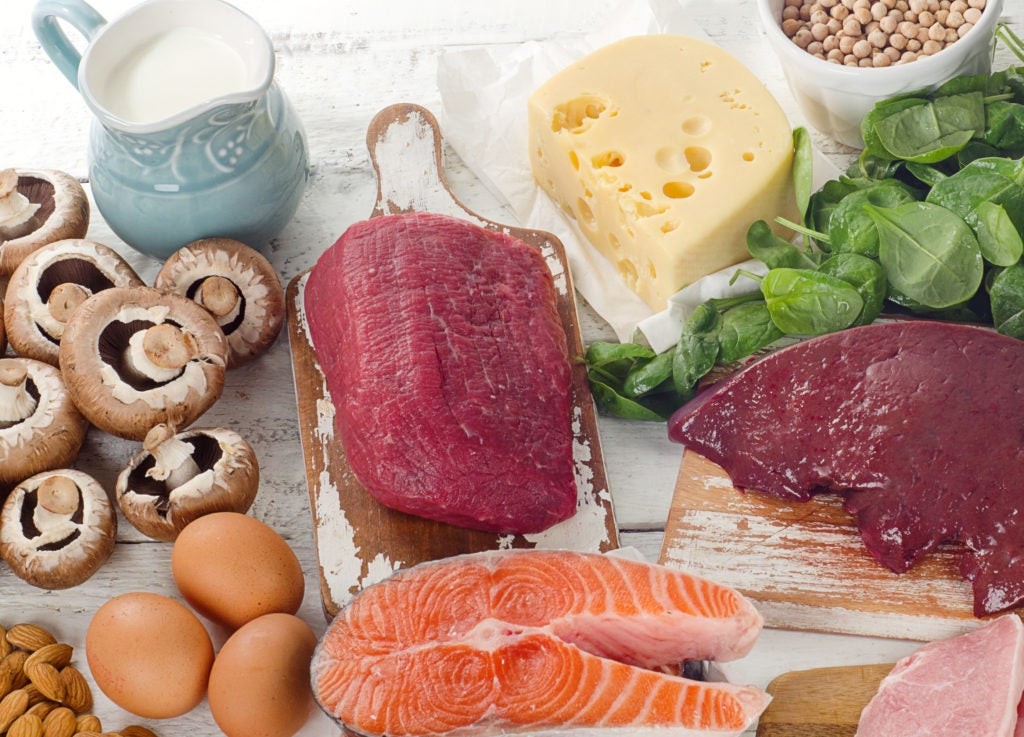Vitamin B2, also known as riboflavin, is an essential nutrient that plays a vital role in energy production, cell growth, and the metabolism of fats, steroids, and medications. While our gut bacteria produce a small amount of riboflavin, it’s often not enough to meet our dietary needs. This guide will explore what foods are rich in B2, the benefits of riboflavin, signs of deficiency, and recommended daily intakes.
 Foods High in Vitamin B2, Including Milk, Yogurt, Eggs, Salmon, Organ Meats, Cheese, Spinach, Beans, Mushrooms
Foods High in Vitamin B2, Including Milk, Yogurt, Eggs, Salmon, Organ Meats, Cheese, Spinach, Beans, Mushrooms
Understanding Riboflavin: Why is it Important?
Riboflavin acts as a key component of coenzymes that are involved in numerous processes throughout the body. These processes are critical for maintaining overall health and well-being. Because riboflavin is not stored in the body to a significant extent, regular intake through diet or supplements is necessary. Excess riboflavin is typically excreted in the urine, sometimes causing it to turn bright yellow.
Recommended Daily Intake of Vitamin B2
The Recommended Dietary Allowance (RDA) for riboflavin varies based on age, sex, and life stage:
- Adult Men (19+ years): 1.3 mg daily
- Adult Women (19+ years): 1.1 mg daily
- Pregnancy: 1.4 mg daily
- Lactation: 1.6 mg daily
A Tolerable Upper Intake Level (UL) for riboflavin hasn’t been established because no adverse effects have been observed from high intakes of riboflavin from food or supplements. However, it’s always best to obtain nutrients from a balanced diet.
Health Benefits of Vitamin B2
Riboflavin’s role in enzymatic processes means it’s important for several aspects of health, and deficiencies can lead to various health problems.
Migraine Prevention
Riboflavin may reduce the frequency of migraine attacks. It reduces oxidative stress and nerve inflammation, both contributors to migraines. Additionally, it supports normal mitochondrial function, and mitochondrial abnormalities can sometimes trigger migraines.
- A clinical trial showed that 400mg of riboflavin daily reduced migraine frequency by two attacks per month compared to a placebo group. Benefits were seen after one month, with maximal benefit after three months.
- A review of multiple trials suggests that riboflavin modestly reduces migraine frequency in adults and children. Adult doses were typically 400 mg daily, and children received 200 mg daily, for three months. Side effects were minimal.
Because riboflavin supplements are relatively inexpensive and have minimal side effects, the American Academy of Neurology and the American Headache Society consider riboflavin a probably effective complementary treatment for migraine prevention.
Cardiovascular Health
Riboflavin is essential for regulating homocysteine levels in the blood. Homocysteine is an amino acid from animal protein; high levels are a risk factor for cardiovascular disease (CVD). Riboflavin works in conjunction with other B vitamins like B6, folate, and B12 to break down homocysteine. While animal studies suggest a cardioprotective effect, human studies haven’t conclusively shown that B vitamin supplementation reduces the risk of heart attacks or CVD-related deaths. Therefore, the American Heart Association doesn’t recommend using B vitamin supplements to reduce CVD risk.
What Foods Have B2? Top Riboflavin Food Sources
Getting enough riboflavin through diet is often easy, given its presence in many foods. Here are some of the best sources of vitamin B2:
- Dairy Products: Milk, yogurt, and cheese are excellent sources of riboflavin.
- Eggs: A versatile and widely consumed source of riboflavin.
- Lean Meats: Lean beef and pork provide a good amount of riboflavin.
- Organ Meats: Beef liver, in particular, is extremely rich in riboflavin.
- Poultry: Chicken breast is another good source.
- Fish: Salmon is a valuable source of riboflavin and other essential nutrients.
- Fortified Foods: Fortified cereals and breads often contain added riboflavin.
- Nuts: Almonds are a good plant-based source of riboflavin.
- Vegetables: Spinach and mushrooms offer riboflavin along with other vitamins and minerals.
Riboflavin Deficiency: Symptoms and Risk Factors
Riboflavin deficiency is uncommon in developed countries but can occur in specific populations. Symptoms include:
- Cracked lips
- Sore throat
- Mouth and throat swelling
- Swollen tongue (glossitis)
- Hair loss
- Skin rash
- Anemia
- Itchy, red eyes
- Cataracts (in severe cases)
Groups at higher risk of riboflavin deficiency include:
- Vegans and Vegetarians: Due to the exclusion of dairy and meat, these individuals may need to pay closer attention to riboflavin intake through plant-based sources or fortified foods.
- Pregnant Women: Increased nutrient needs during pregnancy, especially in those with lactose intolerance or low meat consumption, can increase the risk of deficiency.
Riboflavin Toxicity: Is it Possible?
Riboflavin toxicity is rare because the body only absorbs a limited amount at a time, and excess amounts are excreted in the urine. A Tolerable Upper Intake Level (UL) has not been established due to the lack of observed toxic effects from high intakes of food or supplements.
Fun Fact: Why Milk Isn’t Sold in Glass Bottles Anymore
Riboflavin is sensitive to light. When exposed to excessive light, riboflavin can be deactivated. Therefore, milk is typically sold in cartons or opaque plastic containers to protect the riboflavin content.
Conclusion: Prioritizing Riboflavin Intake
Ensuring adequate riboflavin intake through a balanced diet is important for overall health. Knowing What Foods Have B2 allows you to make informed dietary choices and maintain optimal levels of this essential nutrient. If you have concerns about your riboflavin intake or suspect a deficiency, consult with a healthcare professional or registered dietitian for personalized advice.